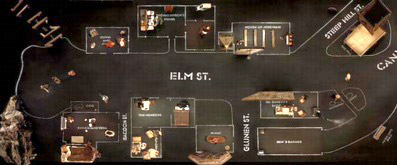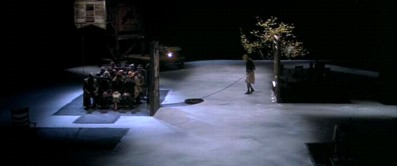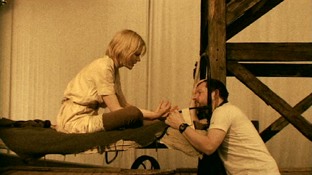'Why
should I be merciful?" |
Grace, played
by Nicole Kidman |
Much
as I hate to categorize anything or anyone, I have to reluctantly
agree that William Goldman hit the nail pretty much on the
head when he wrote that:
"Hollywood
movies reassure. Independent films challenge."
Or:
the former are explicitly, expressly and only made to make
money (art strictly by accident only) and the latter to
express a genuine artistic vision (and to make money if
at all humanly possible – I mean artists need to eat, right)?
It's true that I have been much more enthusiastic about
finding a reassuring movie of quality and worth from those
that seek to reassure. I know I'll find challenging, questioning
and often astonishing works of art if I cast my net wider.
I do but only once in a blue VELVET. I am advised to "watch
this!" and I do. I am suitably amazed, stunned at the
imagination, the virtuosity of direction and performance
and in awe at those who managed to find funding for such
extraordinary films (after all, that's a powerfully necessary
parallel talent). Hollywood pales in any reasonable comparison.

SIDE
NOTE: von
Trier is probably the best known European independent film
maker out there. With Nicole Kidman working with him for
nothing (granted, her make-up person and hairdresser cost
more than von Trier), you'd think the finance for this movie
would be something almost guaranteed. This is the list on
the back of the DVD. How many companies did it take to finance
and distribute this film?
Zentropa
Entertainments8, Filmiväst, ARTE, WDR, 3Cinema, DR,
NPS, 2, Eurimages, NFTF, nrw, COBO, AVFondet, Det Danske
Filminstitut, ÉCLAIR Laboratoires, Nordisk Film Biografdistribution
A/S and Icon.
I'm
sorry?
That's
eleven including the last one, Mel Gibson's company. Did
he read von Trier's screenplay and think, "Hmmm,
a blonde, sexy Christ for the modern age?" Let's not
forget we could take this huge list another way. How about
each and every one of these companies desperately wanted
a piece of the 'cool and respectable by association' von
Trier pie? Serve it up.
So
why don't I seek out more challenging fare more often? Is
my taste so narrow, so parochial? For every one Dancer
in the Dark, there are twenty Dirty
Dancings. For every one von Trier, there're twenty
Schumachers (now there's a thought, a chilling one).
In short, it's less about my taste and more about what I
can share with my family and in writing about those over-hyped,
Hollywood mechanically sign posted popcorn ads, I feel like
I'm potato-chipping away at everything I despise about modern
cinema.
Some
people can eat metaphorical, cinematic lobster every day.
I can only handle it once a month. I was convinced by print
media and friends many months ago that City of God was one of the best movies (mainstream or independent) in
the last few years [it is – Slarek]. I nodded my head. I
really believed them. No, I really did. So what did I do?
I bought the DVD. It sits on my shelves, so far unwatched.
It will be when the timing's right. What am I so scared
of? What is that ridiculous aspect of myself that often
stops me from a truly remarkable cinematic experience? Answers
on a postcard. Slarek, I'm pretty sure, has given
up on convincing me to ditch Hollywood completely and embrace
the true outsiders (artists) of world cinema (including
the US though their World Series tends to exclude the rest
of us). I read his reviews and once in a while catch one
of these works that is rated so highly. I then wonder and
wonder why I don't just get around to seeing them
all.
Sometimes
a movie will come along and have such an effect on a friend
that they will then be utterly incapable of keeping it to
themselves. So much so that said friend made the effort
to buy me a rental copy of the movie he'd been knocked out
by. I put it off for a few days, work/family time filling
in the cracks and then on Sunday morning I sat down, sighed
at the near three hour running time, and slotted that shiny
disc in. Three hours later I was in something approaching
a state of sublime shock. Cinema is alive and well and living
set-less somewhere in the back of beyond called Dogville.
Fifteen townsfolk in a depression-soaked American town,
take in a gangster-sought-after woman who proves to be a
barometer and scapegoat of the town's shortcomings. She
is eventually burdened with a bell and tyre iron attached
to a chain. That's when I knew I was watching something
else (and I mean that in the most positive sense).

That
Lars von Trier is an artist, there can be no doubt. Watch
Breaking the Waves and remain detached.
See? Not that easy. The multi-layers of Dogville,
with its rich associations with theatre, literature, religion,
film and philosophy, earmark it as a work of some significance.
The cliché handed down is that it takes an outsider
to truly illuminate another's culture. Well, not only has
von Trier attempted to illuminate what makes the US (of
A), us (all of us/US), (featured in the UK DVD extras is
von Trier's logical admission that he too is 'an American'),
he does it in such a way to make his extraordinary conclusions
absolutely correct within the framework of his most extraordinary
film. To inject some levity to balance the portentousness,
I have yet to see Dancer
in the Dark... But I have it on DVD. Right
next to City of God.
Nothing
of great significance really happens for two hours (did
I mention that it's a three hour movie)? That's not true.
The ground is carefully laid – or rather the carpet – that
same carpet which will be whipped from under you as you
fall into this film's fly trap of an ending. I take my metaphors
like my alcohol. Mixed. OK, so beautiful, mysterious, stranger
Grace is adopted by Tom in a small town, (Anytown, USA)
in the Rockies. She is accepted by the townsfolk, works
for them and then after she becomes a repository for their
petty morality, amoral leanings and downright criminally
sexual attacks, she has to decide between a few stark choices.
What she decides is what I believe the audience decides
with her. You go so far with a character. To go further
without moral correction (!) seems to be almost wrong and
yet – how does anyone manage to be content at the final
choices of this angel who's prepared to forgive anyone
of their essential and base humanity?
The
design of the film is also noteworthy (and absolutely vital
to the way the film plays out emotionally). There are no
sets, merely stenciled words on the floor indicating whose
house we're in, where a dog sits, a gooseberry bush grows.
There are no walls and door openings and closings are mimed
with their sound effects intact. The set, indeed Dogville
itself, is an enclosed unit of human foibles and immoral
hypocrisy. If it were shot conventionally with ordinary
sets and/or locations, the starkness of the idea would somehow
become more dramatic and therefore less effective.
Von
Trier is reminding us all the time (with the absence of
walls, the barbarous discontinuity of the editing and the
literal writing on the wall and floor) that this is not
a smooth, slick product which will be swallowed by the maw
of the mighty marketing machine and disgorged. It is not
homogenised pap, slapping wet into cinemas for patrons to
suckle ravenously from. Dogville is a tough
sell but the more von Trier's star shines brightly, the
more the central irony solidifies. Rage against the dollar
factory so successfully, that you become a small subsidiary
of that factory. According to the small Cannes documentary
on the UK disc, Dogville sold for obscene
amounts of money (notably for the German market).
RANT: If I see another movie in which a man blames a woman for
making him rape her, I'll scream. I have this theory. Male
sexuality is not all-powerful, a force which a male has
to give in to because of the alluring power of women. Imagine
the following scenario. A male is 30 seconds away from a
climax (it can be felt that far in advance – or so I'm
told). A person then jumps out of the wardrobe next to the
bed and points a very powerful handgun at the male's head.
The owner of the handgun then says, "Stop what you're
doing or I will pull the trigger spraying your brains on
to the wall." I believe that the man will stop. The
man will stop. The man may even be rendered limp by the
threat. The idea that a woman can legitimately entice a
man into rape is simplistic and wrong in every sense. Some
women may flirt with that perceived power but only men can
employ the force and make it so.
But
the simple truth for me is that you can only go so far being
accommodating. After that, if you take advantage, if you
lie, IF YOU RAPE... then you probably deserve being...
Oh shit. I'm against the death penalty.
Art.
Thank you Lars.
RANT
OVER.
Look
at that. I've dismounted the high horse.

Von
Trier's troupe includes some striking acting talent. Tending
her invisible garden and maintaining an invisible path is
Lauren Bacall, her face as iconic as it ever was. Here is
a woman who simply has to be seen (photographed) to 'be'
to establish a strong character. Hidden amongst Dogville's
fifteen is an actress whose talent (criminally) was never
exposed to wider audiences. Maybe that's what Blair
Brown wanted. But look at her early work in Altered
States. She's the absolute star of that film and
then cropped up here and there afterwards (just because
she resembled Jackie Kennedy, did that mean she had to play
the mourning wife to the detriment of a more varied career?)
Stellan Skarsgård, a regular von Trier player, does
too good a job at being an odious farmer who's in thrall
to Grace with horrific consequences. To cleanse myself of
his character's behaviour I had to keep watching the
scene in Deep Blue Sea when he gets his
arm ripped off as Stellan's cross-pollinating cinematic
penance. Nicole Kidman was the genetically modified shark.
Sharp teeth.
Jean
Marc-Barr (as 'the man with the big hat') had me flummoxed.
His star turn in The Big Blue (as well
as his turn in von Trier's Breaking the Waves)
made me think I'd spot him easily. The three 'hats' of the
movie, (the sheriff, the farmer and the freight driver)
are not – not even collectively – Jean Marc Barr. Aha, one
of James Caan's goons (just recognisable given von Trier's
penchant for jump cutting, ever-moving and inelegant camerawork).
Paul
Bettany – the naked Chaucer from A Knight's Tale and more well known as Russell Crowe's sidekick from
both Master and Commander and A
Beautiful Mind (and who first attracted serious critical
acclaim as the young Malcolm McDowell in Gangster
No. 1) – has probably the most difficult part.
He has to leak sympathy carefully released over almost three
hours. He's Dogville's battery, a proud
and vital man whose youth confers upon him a misplaced romanticism.
Allied with naïveté, Bettany's Tom starts as
the film's romantic lead. How he fares really has to be
seen for yourself. But it's a pretty clever performance.
James Caan reprises his gangster personae to chilling effect.
This is Sonny Corleone having miraculously survived the
hail of bullets, now an older, wiser man who knows one thing
that defines him and impacts those he comes into contact
with. He understands power. Ultimate power.
But,
and I wonder if I will ever tire of saying so, the central
performance is a towering one – again from the incomparable
Nicole Kidman. Here is a movie star AND a character actress
who brings Grace to fully fleshed life, to servitude, to
victim-hood and to a destiny that more than once echoes
Mel Gibson's very own 'Eshwar' or Passion's
Jesus as most know him. Kidman wears her vulnerabilities
raw and bloodied on her sleeve. When grit is needed she
does something most actors cannot do and make it appear
natural and effortless. She convinces almost as fast as
the click of a switch. One hundred percent. I won't detail
the dénouement so I can't illustrate how Kidman manages
her extraordinary performance but it's no secret that von
Trier pulls emotional truth from his collaborators like
hooks from fish. The results are often bloody but tremendously
powerful.
You
imagine the days are long on von Trier soundstages (I mean
he shoots his own movies too) but if emotional manipulation
results in such extraordinary films as Dogville,
then Lars, manipulate away. The actors know what they are
getting in to and more often than not, it's a superb movie.
Though
available on a UK region 2 disc, which sports a very fine
transfer but minimal extras, we are looking here at what
is likely to remain the definitive DVD release of the film,
the region 2 Danish 2-disc special edition from the film's
original distributor, Nordisk Film.
Framed
at 2.35:1 and anamorphically enhanced, this is a pristine
transfer that beautifully reproduces the film's carefully
controlled colour palette, is crisp without any visible
edge enhancement and has a near-perfect contrast range.
Shot on high-definition video, with the extraordinary top
shots created on a rig of DV-Cam camcorders and manipulated
in post-production, there is still a strongly filmic look
to the transfer, which reproduces well how it appeared in
the cinema.
Three
soundtracks are on offer here – English 5.1 surround, English
2.0 stereo and French (dubbed) 5.1. Sonically this is not
a show-off film, and though there are some rear effects
and the occasional low frequency visit to the sub-woofer,
it is the crystal clear reproduction of the dialogue (to
give the performers and camera operators von Trier and Anthony
Dod Mantle complete freedom on stage, the actors were individually
micked up) and sparse but sometimes subtly executed sound
effects that earn the transfer full marks.
This
is where the Danish disk and the UK one really part company – where the UK disk has two featurettes and a trailer, the
Danish release has a splendid collection of high quality
extras.
On
disk 1 there is only room for two, the key one being a
selected commentary from Lars
von Trier and DoP Anthony Dod Mantle, divided into five
sections, named for the scenes the discussion accompanies. That lack
of a full commentary may at first seem disappointing, but
the five sequences collectively add up to 123 minutes, more
than two thirds of the total running time. The abrubt way
a couple of them kick off suggests that a full
commentary was actually recorded but was edited down. Whether
this is down to dead patches, a lack of disk space (given
the film's length), too much wandering from the point, or
comments that the lawyers weren't happy with is uncertain,
but what is here is most worthwhile, giving a fair amount
of technical information on the shooting, and von Trier's
approach to specific scenes and characters. There is a sometimes
amusing banter between the two men, with Mantle talking
almost non-stop in places and von Trier a far more low-key
contributor, though when he does talk he always has something
interesting to say, whether it be technical (the complexity
of the overhead shots), artistic (his and Mantle's camera
operating styles), comedic ("Stellan loves to be naked – he's a bit like me that way"), or even confessional
(a scene he is not happy with the writing or direction of).
What does emerge is how important a film this was for him,
and how happy he is with the the finished work, something
he manages to convey without once stooping to the sort of
"I love this [fill in blank]" comments that blight
so many commentaries on recent Hollywood movies. The selected
scenes are, by the way: Tom Meets Grace (27 mins);
Grace Follows Tom's Plan (15 mins); Fourth
of July After All (8.5 mins); Dogville Bares its
Teeth (8.5 mins) and The Last Illustration
(64 mins).
Also
on disk 1 is a Trailer, which
is presented 4:3 and made up almost exclusively of footage
from the Dogville 'Confession Box', more of which can be
found in the featurette Confessions,
which is detailed below. It's an intriguing way to advertise
a film, given that it tells you absolutely nothing about
the story or characters and includes no actual film extracts.

The
bulk of the extras are on disk 2 and kick off with the best
of the lot, a documentary on the making of the film by Sami
Saif entitled Dogville Confessions.
Shot on video, presented in anamorphic 16:9 and running
for 53 mins, this is the sort of background documentary
all true film fans dream of finding on a DVD, an intimate,
stylish and thoroughly involving look at the shooting of
the feature. Essentially in Danish with optional English
subtitles, there are inevitably some sequences with the
actors in which English is the main language, but the subtitles
(Danish and French subtitles are also available) run throughout
the film, whatever language is being spoken, which is fair
enough given the bilingual nature of the content and the
rare multiple subtitle option (at least rare for an extra
feature). The content is constantly fascinating, as much
for seeing the set in its raw, unlit state as it is for
the nicely captured, off-guard moments of rehearsal and
the refusal to pretty things up in the mode of EPKs – von
Trier is shown comforting Kidman with a big hug after the
rape scene, but also in almost petty verbal conflict with
Paul Bettany, a confrontation the director cuts short and
strides away from. At one point von Trier is even caught suffering from what appears to be a form of emotional collapse. The handling
is very much part of the film's effectiveness, from the
nifty editing to the use of sound and slowed-down imagery
to emphasise the weariness of the cast and crew at a press
conference. An excellent inclusion – if only other behind-the-scenes
documentaries were half as good.
Also
part of the Dogville Cinema subsection is
Trier, Kidman and Cannes, a 23 minute look
behind the scenes at the 2003 Cannes film festival, where
Dogville played in competition but astonishingly
won no awards. A production for Danish television, the content
is a mixture of Danish and English, with optional English
subtitles that, unlike on Dogville Confessions,
are specific to the non-English sections of the programme.
This generally lively extra can also be found on the UK
region 2 disk and includes memorable von Trier moments,
one of my favourites being the phone-delivered message in
which he wearily instructs Dogville's executive
producer Peter Aalbaek Jensen to "Tell them I love
them, and they can fuck off."
The
third entry into the Dogville Cinema section is
The Dogville Test, a 6 minute
trail run of key scenes, shot with a Danish
cast and narrator as a test run for the visual style that
was to be a key aspect of finished film. This is referred
to more than once in the main commentary, and is worth checking
out before giving that a listen. There is an optional commentary
for this by von Trier and Anthony Dod Mantle, the key point
of discussion being the balance between naturalism and artificiality.
The
second section consists of seven Interviews,
all shot at Cannes 2003 by a variety of TV crews and ranging
in length from 4 to 7 minutes. The interviews are with Nicole
Kidman, Stellan Skarsgård, assistant director Anders
Refn, producer Vibeke Windelov and Lars von Trier, Kidman
and von Trier being the subject of two interviews each.
All are of interest, but von Trier's are far and away the
most worthwhile, as he frankly discusses the political
aspects of the film and his own views on a modern global
America. Kidman's interviews are conducted in English, all
of the others are in Danish with optional English subtitles.
Confessions,
also on the UK disk, is a 17 minute (divided into six shooting
week-based chapters) compilation of footage shot in the
film's 'confession box' a place where anyone involved in
the production could go to sound off about any aspect of
the film. It's a fascinating inclusion that leaves you aching
for more, the contributions being a nice mix of the jocular
and the sincere. My favourite has to be Cleo King's cheerful
admission that she is rather hot for von Trier,
who she wants to kiss and "hold to my breast."
Dogville
Visuals
has two subsections. Visual Effects
is an 8.5 minute look at the construction of the film's
extraordinary top shots (created with a grid of 156 Sony
PD150 DV-Cam camcorders), crane shots, green screen work
and computer compositing. Save for the narration on the
film extracts, this is a purely visual extra, but more detail
is provided by the optional commentary, in English, by visual
effects supervisor Peter Hjorth. For anyone involved in
or interested in the process of modern digital film production,
this is very good stuff.
Also
in this section is Poster Artwork,
which tracks the development of the promotional artwork for the
film through eight pages which include the poster and a
textual information it in whichever
language you select at the start of the disk (English, in
my case). The posters are reproduced at a decent size and
the text is clear and informative.
The
final section, Press Conferences, contains footage
from three press conferences, extracts from which can be
found in both Dogville Confessions
and Trier, Kidman and Cannes.
Trollhättan 2002 runs for 10 minutes and was shot early
in the filming. The event is hosted in English, has a winningly
ramshackle feel to it, and is interesting to see without
the effects and music applied to it in Dogville
Confessions, where is was seen as a very wearing
experience for the cast and von Trier. Cannes
2003 runs for 21 minutes, is conducted in
English and has its moments, with the comedy supplied by
Stellen Starsgård when his microphone malfunctions:
"I'm a theatre actor!" he booms, "I don't
need this!" He then answers the whole question as if
performing to the gallery. Finally Meeting Danish
Press is a 3.5 minute almost casual Q&A
(it appears to have been done in a corridor) between Danish
journalists and von Trier. Again, this has optional English
subtitles.
Dogville
is, even by von Trier's standards, an extraordinary dramatic
and cinematic achievement and one of the director's most
perfectly realised works to date. It has a remarkable visual
sensibility, a terrific cast on very fine form – Kidman
in particular here proves just how good an actor she can
be given the right role in the right project – and plays
its audience beautifully. Four viewings in, it loses none
of its power, and if anything this helps to confirm its
greatness.
Although
available on a UK region 2 disk with a fine transfer, a
5.1 soundtrack and two reasonable extras, this Danish 2
disk special edition for Nordisk blows it out of the water
and really should be hunted out at all costs by anyone who,
like us, was blown away by von Trier's magnificent vision.
There are a few on-line stores that will help you out here
(try Laserdisken),
though in my case having a Danish brother-in-law certainly
helps here (cheers Kristian!). It's a marvelous film on
a superb double-disk set – Dogville Confessions
is almost worth the trouble of hunting this DVD out alone.
One of the films of the year gets one of the DVD releases
of the year. Excellent.
|